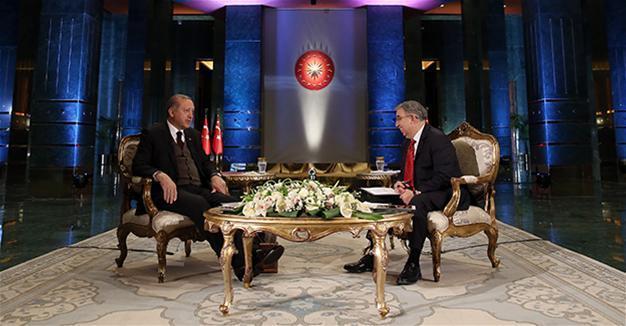Next phase of Euphrates Shield operation to include Iraq: President Erdoğan
ANKARA
 The next stages of the recently concluded Euphrates Shield Operation will be broader, President Recep Tayyip Erdoğan said April 5, suggesting that Turkey would move on areas in Iraq.
The next stages of the recently concluded Euphrates Shield Operation will be broader, President Recep Tayyip Erdoğan said April 5, suggesting that Turkey would move on areas in Iraq.Speaking in a joint interview with NTV and Star, Erdoğan described the Euphrates Shield Operation as the first stage of Turkey’s counter-terrorism road map, saying expanded stages would follow.
A future operation will have “not [only] a Syrian dimension, [but] also an Iraqi dimension. There are the Tal Afar and Sinjar situations [in Iraq]. We also have kin in Mosul,” he said, referring to Turkmens.
Launched in August 2016 and carried out with Free Syrian Army support, the Euphrates Shield aimed to improve security, support coalition forces and eliminate the terror threat along the Turkish border.
It ended on March 29 after Turkey lost around 70 soldiers.
Erdoğan said the situation was worse in Iraq’s Sinjar region, saying the city is about to become the “second Kandil” for the outlawed Kurdistan Workers’ Party (PKK), referring to its headquarters in Iraq’s Kandil Mountains.
“There are around 2,500 PKK terrorists attempting to create this second Kandil,” Erdoğan said.
The PKK has had a presence in the region in the northeastern mountainous outskirts of the Nineveh province since arriving to aid local Yazidi populations after the Islamic State of Iraq and the Levant (ISIL) invaded in August 2014 and Peshmerga forces under the control of Iraqi Kurdish leader Massoud Barzani retreated.
Turkey has previously expressed concerns about the PKK’s presence in Sinjar and said it would take measures, including deploying troops, to prevent it from securing a base in the region.
The president also warned that the mostly Shiite al-Hashd al-Shaabi groups in Iraq were acting as an invasion and occupation movement in Iraq.
“When we look at it all, there is a support for Iranian and Persian nationalism based on sects in Iraq. They disseminate it with sectarianism and spread it on the basis of Persian nationalism,” he said.
















